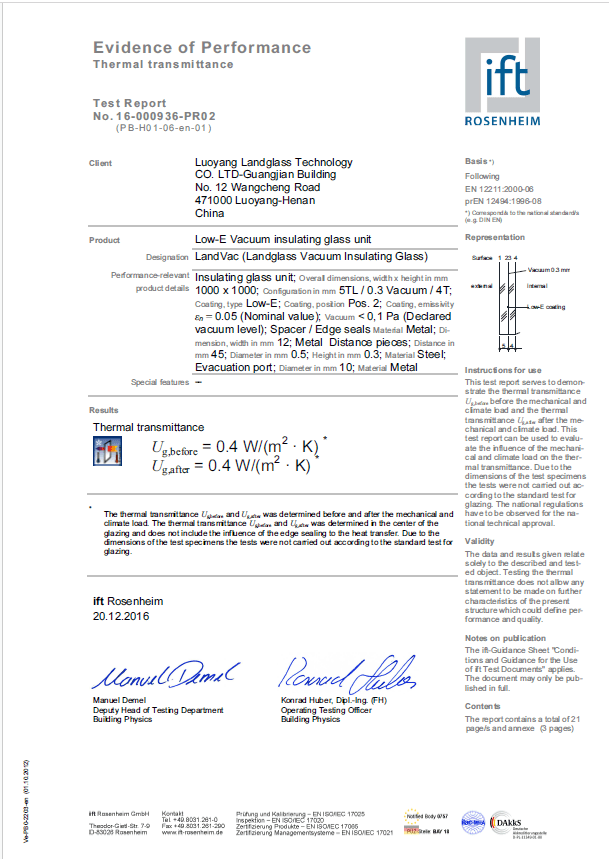
Thermal Efficiency of Vacuum Insulated Glass Units: A Comprehensive Analysis
Vacuum Insulated Glass (VIG) units, such as those produced by LandVac, represent a significant advancement in thermal insulation technology for […]
Vacuum Insulated Glass (VIG) units, such as those produced by LandVac, represent a significant advancement in thermal insulation technology for windows. A recent performance test by IFT Rosenheim provides critical insights into the efficiency of vacuum insulated glass. Here’s a breakdown of the key findings from this test.
Thermal Transmittance Efficiency of Vacuum Insulated Glass
Thermal transmittance, often referred to as the U-value, measures how well a building component conducts heat. Lower U-values indicate better insulation properties. The LandVac VIG units underwent rigorous testing to determine their thermal transmittance before and after exposure to mechanical and climatic loads.
- Initial U-Value: The initial thermal transmittance (Ug,before) of the LandVac units was recorded at 0.4 W/(m²·K). This indicates excellent insulation performance, significantly lower than conventional double-glazed units, which typically have U-values between 1.0 and 1.9 W/(m²·K).
- Post-Load U-Value: After being subjected to mechanical and climate loads, the U-value (Ug,after) remained unchanged at 0.4 W/(m²·K). This stability demonstrates the robustness of the LandVac units under varying environmental conditions.
Mechanical and Climate Load Testing
The durability of the LandVac units was further assessed through mechanical and climate load testing, which simulates real-world conditions such as temperature fluctuations and wind pressure.
- Thermal Load: The units were exposed to external temperatures of +80°C and -15°C while maintaining indoor conditions on the internal side. This test evaluates the unit’s ability to withstand extreme temperatures without compromising its insulating properties.
- Mechanical Load: The units were also subjected to wind pressure to simulate high wind conditions. Deflections were measured to assess structural integrity.
Detailed Results and Implications
The test results confirmed that LandVac VIG units exhibit remarkable stability and durability:
- Thermal Stability: The unchanged U-value post testing signifies that the insulation performance of LandVac VIG units is not adversely affected by severe temperature variations or mechanical stress.
- Structural Integrity: The units maintained their structural integrity under significant mechanical load, ensuring that they can withstand harsh environmental conditions without losing their thermal efficiency.
Conclusion, The Efficiency of Vacuum Insulated Glass
The comprehensive testing of LandVac VIG units by IFT Rosenheim underscores their superior performance and reliability. With an initial and post-load U-value of 0.4 W/(m²·K), these units offer exceptional thermal insulation. This makes them an ideal choice for energy-efficient buildings. Their robustness against mechanical and climatic stresses ensures long-term performance, justifying LandVac’s confidence in offering extended warranties for their products.
To view the full report and other technical reports, please visit our Technical Data Sheets page.
For those seeking to enhance the energy efficiency and comfort of their buildings, LandVac’s VIG units present a cutting-edge solution that combines advanced technology with proven performance.